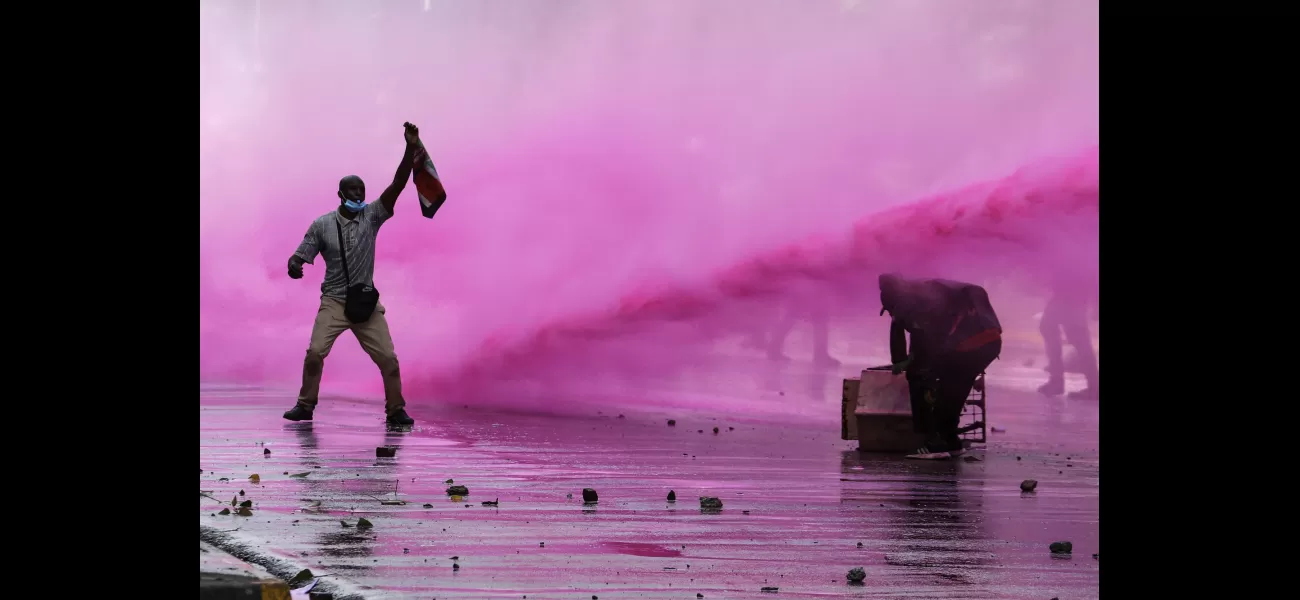Police allegedly killed three protesters as flames consumed the parliament building.
In Nairobi, police shot at people outside a building, and journalists witnessed at least three dead bodies.
June 25th 2024.

In a dramatic turn of events, the streets of Nairobi, Kenya were filled with chaos and violence as protestors clashed with police and set fire to the country's parliament building. It was a bold and direct attack on the government, something that hasn't been seen in decades.
As journalists arrived on the scene, they were met with a grim sight. At least three bodies lay outside the parliament complex, victims of the police's use of tear gas and live bullets against the protestors. The tension was palpable as reports of the internet being blocked in Kenya surfaced, a clear indication of the government's efforts to silence the demonstrations.
The protest was a response to a new finance bill that would impose additional taxes on everyday goods, further burdening the already struggling citizens. For years, Kenyans have been frustrated with the high cost of living, and this bill was the last straw. Outraged and determined, the protestors managed to outmaneuver the police and enter the parliament building, where legislators had just passed the controversial bill.
Amidst the chaos and violence, a glimmer of hope emerged. The opposition legislators who had voted against the bill were allowed to leave the besieged building by the protestors, showing a sense of unity and solidarity among those fighting for their rights.
However, the situation was far from being resolved. The tensions only continued to escalate as more reports of protestors being shot and killed by police came in. The Kenya Human Rights Commission even shared a video showing officers firing at protestors and promised to hold them accountable for their actions.
One of the main concerns of the protestors was the introduction of new taxes, including an eco-levy that would significantly increase the prices of essential items like sanitary towels and nappies. The president of the Kenya Law Society, Faith Odhiambo, even reported that 50 Kenyans, including her personal assistant, had been "abducted" by suspected police officers.
The situation was dire, with civil society groups revealing that many of those who had gone missing were prominent voices in the ongoing demonstrations. They had been taken from their homes, workplaces, and public spaces in the days leading up to the protests.
As the chaos continued, Parliament Speaker Moses Wetangula demanded answers from the inspector general of police regarding the whereabouts of those who had been abducted. Meanwhile, President William Ruto was out of the capital, attending an African Union retreat. Just two days prior, he had expressed his pride in the youth who had taken a stand for their democratic rights and promised to address their concerns.
The events in Kenya were a clear reflection of the people's frustration and their determination to fight for their rights. The situation was far from over, and the government would need to take swift and meaningful action to address the concerns of its citizens.
As journalists arrived on the scene, they were met with a grim sight. At least three bodies lay outside the parliament complex, victims of the police's use of tear gas and live bullets against the protestors. The tension was palpable as reports of the internet being blocked in Kenya surfaced, a clear indication of the government's efforts to silence the demonstrations.
The protest was a response to a new finance bill that would impose additional taxes on everyday goods, further burdening the already struggling citizens. For years, Kenyans have been frustrated with the high cost of living, and this bill was the last straw. Outraged and determined, the protestors managed to outmaneuver the police and enter the parliament building, where legislators had just passed the controversial bill.
Amidst the chaos and violence, a glimmer of hope emerged. The opposition legislators who had voted against the bill were allowed to leave the besieged building by the protestors, showing a sense of unity and solidarity among those fighting for their rights.
However, the situation was far from being resolved. The tensions only continued to escalate as more reports of protestors being shot and killed by police came in. The Kenya Human Rights Commission even shared a video showing officers firing at protestors and promised to hold them accountable for their actions.
One of the main concerns of the protestors was the introduction of new taxes, including an eco-levy that would significantly increase the prices of essential items like sanitary towels and nappies. The president of the Kenya Law Society, Faith Odhiambo, even reported that 50 Kenyans, including her personal assistant, had been "abducted" by suspected police officers.
The situation was dire, with civil society groups revealing that many of those who had gone missing were prominent voices in the ongoing demonstrations. They had been taken from their homes, workplaces, and public spaces in the days leading up to the protests.
As the chaos continued, Parliament Speaker Moses Wetangula demanded answers from the inspector general of police regarding the whereabouts of those who had been abducted. Meanwhile, President William Ruto was out of the capital, attending an African Union retreat. Just two days prior, he had expressed his pride in the youth who had taken a stand for their democratic rights and promised to address their concerns.
The events in Kenya were a clear reflection of the people's frustration and their determination to fight for their rights. The situation was far from over, and the government would need to take swift and meaningful action to address the concerns of its citizens.
[This article has been trending online recently and has been generated with AI. Your feed is customized.]
[Generative AI is experimental.]
0
0
Submit Comment





